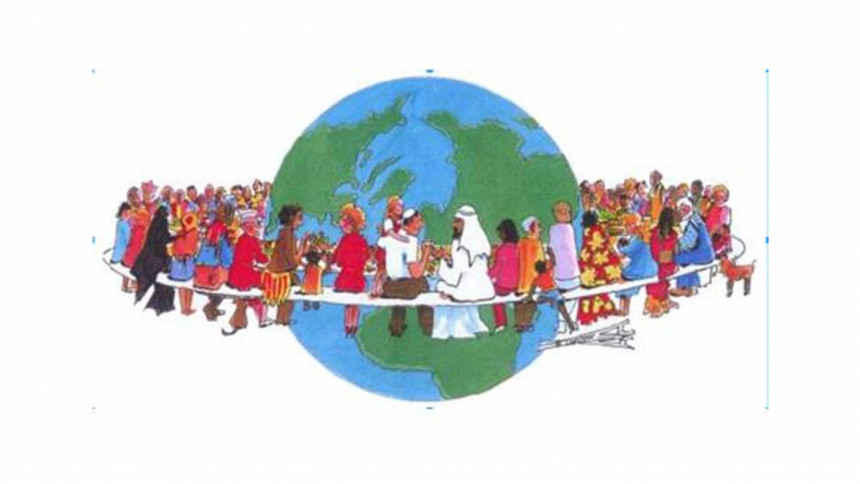

The foreign policy crisis that has arisen in India due to inflammatory statements will hopefully pass sooner rather than later. For a short while, voluntary restraint on giving many more examples of such harmful, injurious statements may be advisable as a part of damage control. However, the biggest lesson that we must take from this crisis should be to strengthen the firm belief that interfaith harmony is a basic precept of Indian society, on which consensus should be created with many-sided efforts.
The task ahead for the ruling regime is not just to “tone down the polarisation discourse” as is being argued in some places – that would be grossly understating a new agenda even before it has been rolled out. The task ahead is to firmly establish that interfaith harmony again becomes a basic precept of policy and society in India. Nothing less than this would be acceptable; nothing less than this should be attempted. The authorities should be sincere, and if they are, everyone should cooperate.
In this great task of re-establishing interfaith harmony as a basic precept, we can learn much from history. Among all the great spiritual leaders of recent centuries, in a country known for many great spiritual movements, those who gave the message of peace and non-violence had the most durable impact on people, to the extent that the highest respect by countless followers even 2,700 years later is for such a legacy of Gautam Buddha and Mahavira Jain. As we move further in history, millions of followers still seek solace in the hugely inspiring, path-illuminating messages of Guru Nanak and Sant Kabir, who ask people to rise above narrow divides to open themselves to the path of true spirituality and ethics.
During the freedom movement, the greatest following was attracted by those leaders who, despite other differences, were completely united – very firmly too – on the basic precept of interfaith harmony. This can certainly be said of the greatest leaders such as Bhagat Singh, Subhash Chandra Bose, Mahatma Gandhi, Badshah Khan, Jawaharlal Nehru, and Maulana Azad. It is these leaders, with their common ground of a firm faith in interfaith harmony, who received the greatest affection of the Indian people of all faiths.
As for those with a narrow sectarian agenda, they could get a hearing among people only when the real leaders named above were imprisoned or in exile or had achieved martyrdom, and the colonial rulers then used this as an opportunity to support and push ahead divisive leaders who suited their divide-and-rule agenda.
In the post-independence period, it is well-known that Jawaharlal Nehru, who was India’s prime minister for 17 years and won three general elections in a multi-party democracy with over 45 percent vote, accorded the highest importance to interfaith harmony, and this was reflected in policy, enabling free India to recover from the wounds of partition and walk the noble path of interfaith harmony, protection of minorities and secularism, setting a great example for the world, even as Pakistan got well-deserved criticism for its path of sectarianism.
Equality of all religions was established firmly by the Indian Constitution. The tallest opposition leaders of post-independence India, Jayaprakash Narain and Ram Manohar Lohia, were also very firm in their commitment to interfaith harmony.
We must draw on this legacy and build further on this. Even those who in the past were not favourably inclined towards this basic idea of India should realise from recent experiences the importance of interfaith harmony. This gets worldwide respect and admiration, while ideologies based on sectarianism or minority-bashing are condemned worldwide – at times even leading to crisis situations in foreign relations.
However, it is problematic to say that all that has to be done is to tone down communal polarisation. Will it be considered all right if the bigger leaders avoid communally charged statements, but the street-level talk of the cadre remains the same? No, it will not. Cadres become leaders later, and what is in the mind all the time comes out sooner or later in statements, actions and policies.
What we need is nothing less than getting rid of the devil of communal disharmony, communalism and sectarianism from the hearts and minds of all people. The aim of creating a society based on interfaith harmony and equality of all faiths should be accepted as a basic precept; once this aim is well-established, then ways to best achieve this can be discussed in detail subsequently.
The emphasis in the coming days should be on widespread, broad-based steps to promote interfaith harmony, while also putting checks on those forces and organisations which have been spreading disharmony and hatred in India. It should be made very clear to such forces and individuals that any activities relating to disharmony and hatred as well as violence will be dealt with very strictly from now onwards.
This article first appeared in The Statesman, an ANN partner of The Daily Star.
Bharat Dogra is an Indian freelance journalist who has been involved with several social movements and initiatives.










